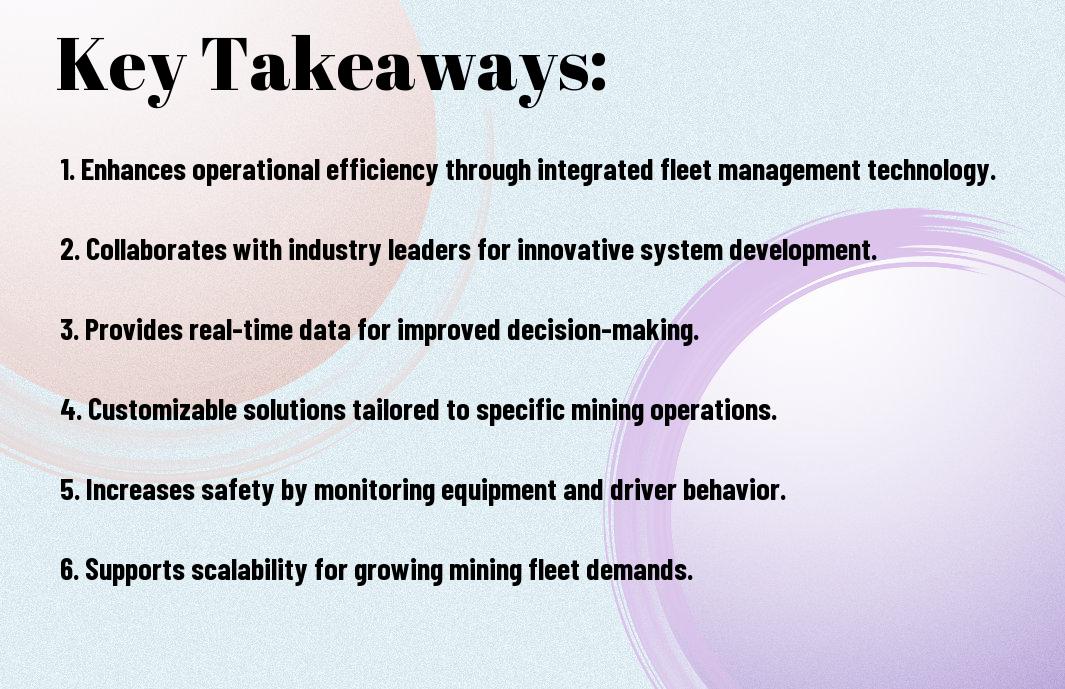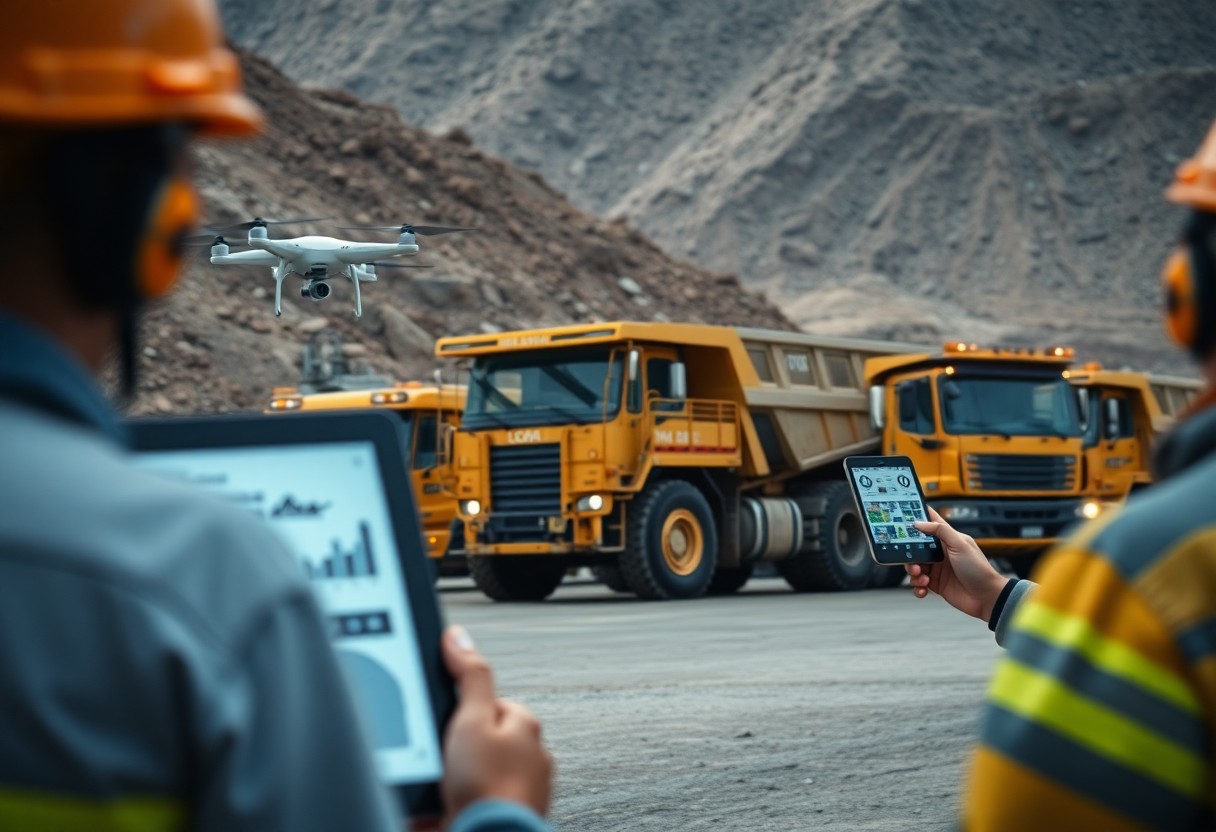Over the past few years, I’ve seen how Modular Mining Systems has transformed the landscape of fleet management in mining operations. By partnering with industry leaders, they have developed advanced systems that enhance productivity, safety, and operational efficiency. These cutting-edge solutions not only minimize risks but also maximize the performance of your assets. If you’re looking to take your mining operations to the next level, understanding these advancements is important for your success.
Key Takeaways:
- Modular Mining Systems emphasizes collaboration with industry partners to enhance technology in fleet management, aiming to improve operational efficiency and productivity in mining operations.
- The development of advanced software solutions enables real-time monitoring and decision-making capabilities, helping companies respond quickly to changing operational conditions.
- Integration of innovative technologies, such as IoT and data analytics, plays a significant role in providing valuable insights and optimizing resource allocation across mining fleets.

Overview of Modular Mining Systems
Your exploration of Modular Mining Systems begins with their remarkable commitment to developing advanced fleet management systems tailored for the mining industry. Founded in 1979, this company has consistently driven innovation in the field, focusing on enhancing operational efficiency and safety for mining operations around the globe. By continuously fostering partnerships with industry leaders and adapting to the relentless demands of modern extraction practices, Modular Mining has solidified its reputation as a pioneer in the sector.
Company History and Vision
Overview of Modular Mining Systems reveals a dynamic history marked by innovation and resilience. Starting from humble beginnings, the company has evolved into a global leader in the mining technology sector, with a vision that emphasizes sustainable mining operations and the integration of cutting-edge technology. Their goal is not just to provide tools, but to partner with clients in achieving their operational objectives while maintaining a focus on safety and environmental stewardship.
Core Technologies and Innovations
Vision for Modular Mining Systems includes the development of highly advanced technologies that empower mining operations to achieve greater productivity and efficiency. Their flagship product, the DISPATCH® system, provides real-time data and analytics, enhancing decision-making processes and maximizing fleet performance. By using state-of-the-art algorithms to optimize haulage operations, you can substantially reduce operational costs while improving overall site safety—a vital aspect in the often hazardous mining environment.
Mining is an industry that demands constant evolution, and Modular Mining Systems excels at meeting these challenges head-on. With a strong emphasis on real-time data analytics, the company leverages innovations in machine learning and IoT technologies to transform traditional mining practices. These advancements not only improve operational efficiency but also significantly enhance safety measures for personnel, allowing you to trust that your fleet management systems are paving the way for sustainable practices within the industry.

Importance of Fleet Management Systems
It is necessary to recognize that fleet management systems act as the central nervous system for mining operations. These systems integrate various components such as vehicle tracking, maintenance scheduling, and real-time data analysis to optimize performance and efficiency. By implementing a robust fleet management system, you not only streamline operations but also enhance safety and compliance protocols across your mining site.
Definition and Functionality
On a fundamental level, fleet management systems are designed to monitor and manage a company’s fleet of vehicles and equipment. Their primary functionality includes identifying the location of assets, monitoring their usage, and analyzing performance data to make informed operational decisions. This real-time visibility empowers you to anticipate problems before they occur and respond promptly to any operational issues, thereby minimizing downtime and maximizing productivity.
Benefits to the Mining Industry
Importance of fleet management systems in the mining industry cannot be overstated. These systems offer a wide range of benefits, including enhanced safety, reduced operational costs, and improved resource allocation. By systematically tracking your equipment and vehicles, you can proactively schedule maintenance and repairs, significantly reducing the risk of costly breakdowns. Furthermore, efficient route planning minimizes fuel consumption and helps in managing the logistical challenges that often arise in mining operations.
Mining operations stand to gain immensely from the integration of advanced fleet management systems. With the ability to monitor performance 24/7, you can significantly improve operational efficiency and reduce maintenance costs. Furthermore, these systems enhance safety protocols by allowing you to track equipment utilization and ensure compliance with regulations. The positive impact of a well-implemented fleet management system can lead to increased profitability and a more sustainable operation, ultimately supporting your long-term success in the mining industry.
Partnering for Success
Not every mining company can thrive alone in today’s competitive landscape. Effective partnerships can redefine success by pooling resources, expertise, and innovative ideas. At Modular Mining Systems, I recognize that a collaborative approach not only enhances our capabilities but also allows us to provide tailored solutions that meet the specific needs of our clients. By forging strong partnerships, we can drive performance improvements and ensure that our advanced fleet management systems are implemented seamlessly, resulting in maximized efficiency and profitability for the mining operations we support.
Collaboration Models with Clients
One of the most effective ways to achieve success is through various collaboration models that we have developed alongside our clients. Our partnership frameworks emphasize open communication, shared goals, and mutual investment in each other’s success. Depending on your organization’s structure and needs, we can engage in different models such as joint ventures, strategic alliances, or even dedicated project teams that work in tandem with your staff. This fluidity ensures that we remain aligned with your operational goals and can adapt as your needs evolve.
Case Studies of Successful Partnerships
Case studies provide tangible evidence of the effectiveness of our collaborative approaches. I believe these partnerships showcase the extraordinary results we can achieve together.
- Global Mining Company A: Achieved a 25% reduction in equipment downtime by implementing our fleet management system, leading to a 15% increase in overall productivity.
- Mining Operation B: Realized a 30% savings on operational costs through customized analytics solutions that optimized resource allocation and equipment usage.
- Minerals Producer C: Recorded a 40% improvement in their supply chain efficiency after utilizing our predictive maintenance technology, which resulted in fewer operational interruptions.
In addition to showcasing the effectiveness of our partnership models, these case studies illustrate the significant impact our collaboration can have on the bottom line of mining operations. The data reflects the understanding that adapting to new technologies and optimizing fleet management can lead to substantial economic benefits. I encourage you to consider these transformative opportunities as you think about the future of your operations and the potential benefits of partnering with Modular Mining Systems.
Advanced Technologies in Fleet Management
After exploring the landscape of fleet management, I have observed that advanced technologies play a transformative role in improving operational efficiency and safety. Implementing these technologies is not a luxury anymore; it has become a necessity for organizations looking to stay competitive. Here are some key technologies that are making a significant impact:
- Real-time data analytics
- Automation and remote management
- Predictive maintenance
- Telematics systems
- Integrated communication tools
| Technology | Benefits |
|---|---|
| Real-time data analytics | Enables quick decision-making, enhances operational visibility |
| Automation | Reduces human error, enhances operational efficiency |
| Predictive maintenance | Minimizes downtime, extends vehicle lifespan |
Real-Time Data Analytics
The integration of real-time data analytics into fleet management is a game-changer. By leveraging these analytics, you can gain immediate insights into vehicle performance, driver behavior, and overall fleet status. This information allows you to make informed decisions swiftly, minimizing unplanned downtime and enhancing your fleet’s productivity. With actionable data at your fingertips, the process becomes more transparent, enabling timely interventions when necessary.
Moreover, I have found that data-driven decisions can also lead to significant cost savings. By monitoring and analyzing real-time data, you can identify patterns that may indicate inefficiencies or potential safety risks, allowing you to address them before they escalate. Your ability to optimize routes, manage fuel consumption, and foresee maintenance needs improves drastically, leading to a more sustainable operation.
Automation and Remote Management
Beside enhancing efficiency, automation and remote management are reshaping how fleet operations are executed. By utilizing these technologies, tasks such as monitoring vehicle performance and managing driver schedules can be executed remotely with minimal human intervention. This shift not only streamlines processes but also significantly elevates safety by giving you the ability to respond to incidents swiftly.
I have witnessed firsthand how automation minimizes errors caused by manual processes. The digital tools available today allow for real-time monitoring of various fleet metrics, so you can manage your fleet from virtually anywhere. This capability not only enhances your operational effectiveness but also provides peace of mind, knowing that you maintain control regardless of your location.
Remote monitoring is a powerful tool that ensures the continued safety of your fleet and operators. By accessing real-time data on vehicle performance, location, and driver behavior, you are empowered to make timely decisions that can prevent potential hazards. With automation, repetitive tasks can be executed without delays or errors, which means you can focus on higher-level strategic planning while ensuring your fleet operates at an optimal level.
Challenges and Solutions
Unlike many industries, the mining sector faces specific hurdles when it comes to implementing advanced fleet management systems. These challenges include the variability of operational environments, resistance to change among employees, and the need for integration with legacy systems. As I have observed in discussions with industry professionals, these hurdles can hinder the full realization of benefits offered by advanced technologies, making it imperative to understand and address them effectively in your operations.
Industry Challenges in Implementation
Around the globe, mining operations are often located in remote areas and are influenced by unpredictable weather conditions and shifting ground stability, which can complicate the deployment of new systems. Furthermore, there is frequently a gap in employee training, leading to a lack of proficiency in utilizing advanced technologies. This resistance can stem from a fear of obsolescence or a general reluctance to move away from traditional methods. Therefore, you may find your operational goals stymied by inconsistencies in employee engagement and technology adoption.
Modular Mining’s Approach to Overcoming Barriers
An effective approach to overcoming these barriers is integral to the success of Modular Mining’s systems. The company focuses on customizable solutions that can adapt to specific operational challenges. Additionally, they prioritize comprehensive training programs aimed at equipping employees with the necessary skills and knowledge to leverage new technologies to their fullest potential. This not only enhances employee confidence but also facilitates a smoother transition to digital solutions, ultimately leading to improved productivity and operational efficiency.
Indeed, Modular Mining recognizes that a strong collaboration between management and frontline workers is crucial in overcoming the resistance towards new technologies. By fostering a culture of open communication and continuous learning, they help mining organizations navigate the complexities of technology adoption. Their tailored solutions ensure that the unique needs of each operation are considered, thus maximizing the positive impact of advanced fleet management systems on your mining operations.
Future Trends in Fleet Management
Despite the ever-evolving landscape of fleet management, I foresee that we are on the brink of significant advancements that will redefine how fleets operate. The integration of artificial intelligence and machine learning into fleet management systems is not merely a trend; it’s a revolution. These technologies will enhance predictive maintenance capabilities, allowing for real-time monitoring and proactive decision-making. As a result, operators can expect reduced downtime and increased operational efficiency, ultimately leading to improved safety and lower operational costs.
Predictions for Upcoming Innovations
Any expert in the industry will tell you that the next wave of innovations will focus on automation and connectivity. Automated vehicles and drones are likely to play a significant role in fleet management, streamlining logistics and enhancing productivity. With the rise of IoT (Internet of Things), I see an interconnected ecosystem emerging where vehicles, operators, and equipment will communicate seamlessly, allowing for real-time adjustments based on data analysis. This interconnectedness will not only improve efficiency but will also open new avenues for optimizing routes and resource allocation.
The Role of Sustainability in Fleet Management
Predictions indicate that sustainability will soon become a foundational principle in fleet management practices. I believe that consumers and businesses alike are increasingly prioritizing eco-friendly alternatives, which will drive operators to adopt clean energy solutions and implement sustainable practices across their fleets. Incorporating electric vehicles and optimizing routes to minimize fuel consumption will not just enhance efficiency; it will position your fleet as a leader in reducing environmental impact.
Management of a fleet that embraces sustainability can yield multiple benefits. You can reduce your carbon footprint while also taking advantage of potential savings on fuel and maintenance costs. By aligning your operational strategies with sustainable practices, you stand to enhance your company’s reputation, attract environmentally-conscious clients, and comply with increasingly strict regulations. As the demand for accountability in sustainability rises, the importance of integrating such principles into your fleet management practices cannot be overstated.
Final Words
With these considerations, I believe that partnering with Modular Mining Systems provides an unparalleled opportunity for you to enhance your fleet management systems. Their commitment to innovation and efficiency can transform your operations, allowing for improved productivity and safety in various mining applications. The integration of their advanced solutions not only aids in real-time data analysis but also fosters a collaborative environment where your team can achieve their objectives more effectively.
As we continue to navigate an ever-evolving industry landscape, I encourage you to explore how Modular Mining Systems can support your unique operational needs. Their established reputation for delivering customized solutions is something you can trust. To gain deeper insights, I invite you to read about their offerings in Modular Mining Systems – Mine | Issue 81 | June 2019, as it may provide you with valuable information to consider in your strategic planning.
FAQ
Q: What are the key benefits of partnering with Modular Mining Systems for advanced fleet management?
A: Partnering with Modular Mining Systems offers several significant advantages, including access to cutting-edge technology designed to enhance operational efficiency and productivity. Their systems provide real-time data analytics, which help in decision-making processes. Additionally, their expertise in mining solutions allows for tailored fleet management systems that can be integrated seamlessly with existing operations, thereby reducing downtime and improving overall fleet utilization.
Q: How does Modular Mining Systems ensure the customization of fleet management solutions for different mining operations?
A: Modular Mining Systems employs a consultative approach to understand the unique needs of each mining operation. This involves working closely with clients to assess their specific operational challenges and requirements. The team then utilizes this information to develop specialized solutions that can be configured to fit the particular circumstances of the site, ensuring that the implemented fleet management system aligns well with the operational goals and enhances overall efficiency.
Q: What support and resources does Modular Mining Systems offer during the implementation of their fleet management systems?
A: Modular Mining Systems provides comprehensive support throughout the implementation process, including on-site training for personnel to ensure they are proficient in using the new technologies. They also offer continuous technical support post-implementation to resolve any issues that arise and to assist with system upgrades. Furthermore, they provide access to a wealth of resources, such as documentation, online training modules, and a support network to help clients maximize the benefits of their fleet management systems.









